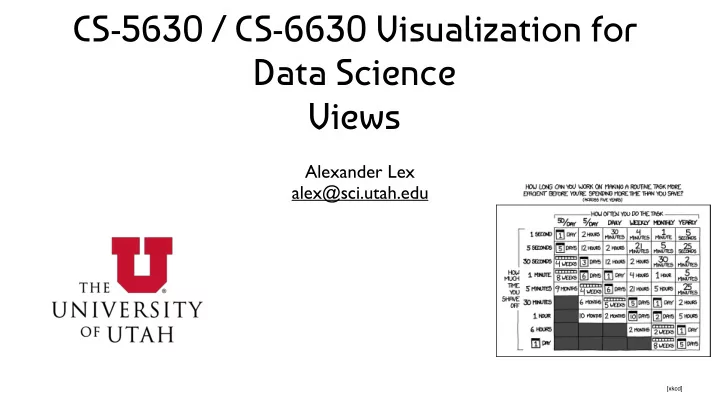

CS-5630 / CS-6630 Visualization for Data Science Views Alexander Lex alex@sci.utah.edu [xkcd]
Multiple Views Eyes over Memory: Trade-off of display space and working memory
Linked Views Multiple Views that are simultaneously visible and linked together such that actions in one view affect the others.
Linked Views Options highlighting: to link, or not navigation: to share, or not encoding: same or multiform dataset: share all, subset, or none
Linked Highlighting
Linked Highlighting
Multiform difference visual encodings are used between the views implies shared data either all data or subset of data (overview + detail) rational: single, monolithic view has strong limits on the number of attributes that can be shown simultaneously different views support different tasks
Multiform Different Views here also same data
MatrixExplorer Same Data - Different Idioms (Multiform) Henry 2006
OVERVIEW + DETAIL one view shows (often summarized) information about entire dataset, while additional view(s) shows more detailed information about a subset of the data rational for large or complex data, a single view of the entire dataset cannot capture fine details
Stack Zooming Same Data - Same Encoding, Different Resolution [Javed & Emlqvist, PacificVis, 2010]
MizBee Multiform Overview & Detail [Meyer 2009]
StratomeX
SMALL MULTIPLES each view uses the same visual encoding, but shows a different subset of the data rational quickly compare different parts of a data set, relying on eyes instead of memory
Small Multiples for Graph Attributes [Barsky, InfoVis 2008]
StratomeX
Partitioning
PARTITIONING action on the dataset that separates the data into groups design choices how to divide data up between views, given a hierarchy of attributes how many splits, and order of splits how many views (usually data driven) partition attribute(s) typically categorical
Partitioning Partitioned by State Partitioned by Age Group and State
Partition by Category
Trellis Plots panel variables attributes encoded in individual views partitioning variables partitioning attributes assigned to columns, rows, and pages main-effects ordering order partitioning variable levels/states based on derived data support perception of trends and structure in data Becker 1996
Data Barley Yields in two years across multiple farms for multiples barley strains partitioning variables Columns partitioned by year Rows partitioned by farm Becker 1996
Becker 1996
Recursive Subdivision partitioning: flexibly transform data attributes into a hierarchy use treemaps as spacefilling rectangular layouts Treemap
HiVE example: London property partitioning attributes house type neighborhood sale time encoding attributes average price (color) number of sales (size) results between neighborhoods, different housing distributions within neighborhoods, similar prices Slingsby 2009
HiVE example: London property partitioning attributes neighborhood house type sale time (year) sale time (month) encoding attributes neighborhood location (approximate) average price (color) n/a (size) results expensive neighborhoods near center of city Slingsby 2009
https://vimeo.com/9870257
LAYERING combining multiple views on top of one another to form a composite view rational supports a larger, more detailed view than using multiple views trade-off layering imposes constraints on visual encoding choice as well as number of layers that can be shown
JOSEPH MINARD 1781-1870
overlays
Dual Axis
Dual Axis (don’t)
Combined Partitioned + layered graph Synchronized through highlighting
MCV to the Max
Recommend
More recommend